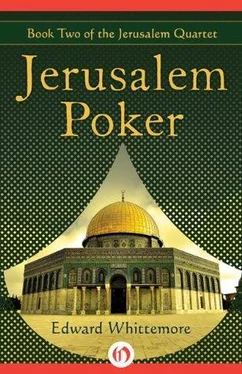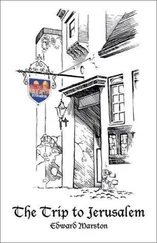And so they were. Smiling gently, she closed her eyes. Those sweet words from her husband the last she heard in life.
For years an exact count couldn't be made of Johann Luigi's love letters. But not long after he left Budapest, two facts had become apparent to Sarah.
First, the love letters were beginning to fill the floor-to-ceiling bookcases she had built in her kitchen so his letters would be near her while she was cooking.
And second, the love letters were likely to become the most complete source of information on the Middle East to be found anywhere in Europe.
By nature Sarah was an imaginative and energetic woman who found housework tedious. Therefore as soon as her children were no longer infants she began to cast about for a project that could engage her talents.
One Friday afternoon while reading a letter from her husband on Damascus cutlery, an idea struck her.
As was obvious, the amount of detail on purely commercial matters in her husband's love letters was no less than astonishing. Why not use this information for a trading venture?
Secretly she went to a moneylender and mortgaged her house to raise funds. The sale of imported Damascus cutlery was a success and with the profits she turned to a second scheme, rugs from Persia, as described in another love letter. The rugs paid off her mortgage and after that came cotton from Egypt and jewels from Baghdad.
With business growing, Sarah began employing her sisters and aunts and female cousins as bookkeepers.
Momentum gathered as more love letters arrived from the wandering Johann Luigi, detailing possibilities of new markets. Paying interest on bank loans seemed a waste of resources, so Sarah decided to found her own merchant bank.
Banking soon intrigued her as much as trade, so she opened a commercial bank as well. Its operations multiplied and she bought several other banks. By the age of forty her banking assets were the largest in Budapest, and by the age of fifty her branches in Vienna and Prague and elsewhere accounted for the bulk of financial business in those cities. Assets swelled, as did trade with the Levant, based on her husband's love letters.
Until by the time of her death the House of Szondi, as it had come to be called, was the single most powerful financial institution in central Europe.
The executive pattern of the House of Szondi remained the same after her death. From the beginning the boards of the banks had been staffed exclusively by her female relatives, first sisters and aunts, later nieces and grand-nieces.
The senior managing board for all the banks, known collectively when in session as the Sarahs, in honor of the founder, met upon her death and naturally chose not Sarah's son but her daughter to be the new head of the House.
Sarah the Second assumed her position as managing directress, but being less single-minded than her mother she also took into consideration the men of the family. Now that the House of Szondi had become so rich it seemed ridiculous, to her, for the husbands and sons and fathers of the directors to be still working as petty local traders, the only life they had known since the ninth century.
Even her own older brother Munk was still running a discount dry goods store on the lower east side of Budapest, where he labored long hours stacking imperfect sheets and pillowcases.
Sarah the Second knew that her brother had always secretly loved the violin, which he played at home in a tiny windowless room no bigger than a closet, music being widely viewed as a frivolous pastime in his trade, where men were supposed to have strictly practical interests.
So Sarah the Second made her brother an offer. If Munk would come out of the closet and devote himself full-time to his real passion, music, she would support him for the rest of his life. Naturally Munk was enthusiastic and readily agreed.
At the next meeting of the Sarahs she announced what she had done, thereby in effect setting the course for a new family pattern. The directors were quick to follow her example and other secret musicians soon emerged from among the males in the family. Munk himself was immediately joined by three cousins, equally talented men who had also been running discount stores on the lower east side of Budapest.
Together they formed a competent string quartet, which was soon in demand on the concert circuit.
The next generation of male Szondis was surrounded by music from childhood. Brothers and nephews and grand-uncles took to practicing together, under the baton and guidance of the reigning Munk, and over the following decades the all-male Szondi Symphonic Philharmonic, not to mention the numerous Szondi baroque ensembles, became as famous in the musical circles of central Europe as the all-female House of Szondi had become in the world of banking.
Thus while the women of the family made money, led by the reigning Sarah, the men of the family made music, led by the reigning Munk. But in keeping with the new matriarchal traditions of the family the first-born male in each generation, the new Munk, was never the son of a Munk but always the son of a Sarah, and therefore the eldest nephew of the last Munk, a confusing line of descent not easily understood by anyone but the Szondis.
The Szondi women naturally spent long hours doing research in the family archives in connection with their business training, but the Szondi men also had a special obligation in that regard.
Each spring they put aside their music and returned to the roomy old kitchen of Sarah the First, there to spend the months of annual awakening immersed in the bookshelves that contained the sources of the family's material and artistic success, amidst the twitterings of the birds outside in the garden and the heady fragrances of new flowers wafting into the kitchen on gentle breezes, perusing at their leisure those thousands and thousands of tender love letters a wandering Szondi husband had once sent to his loyal Szondi wife.
The future Munk of Jerusalem poker, born in 1890, chose the cello as his musical instrument and naturally he mastered it. But he was also an exception among male Szondis, because music didn't seem enough to him in life. Vaguely he yearned for something quite different, although what it might be he didn't know.
In fact as a boy, young Munk tried every conceivable occupation for a week or a month, avidly pursuing his new role. For a while he was a postman, then a fireman, then a railroad conductor. In the spring of his ninth year he was a surgeon operating in his bedroom, only to turn that summer to hunting lions and elephants in public gardens. By the following autumn he had already tried horticulture and painting and carpentry, and served as a distinguished judge.
When he was eleven he fell under the spell of the letters of his great-grandfather, the tireless Johann Luigi Szondi, and proceeded to relive those prodigious travels up and down the Nile and across the Middle East. He too marveled at the deserted stone city of Petra and marched through Nubia eating dates, covering nine hundred miles in a month, then paused to measure Rameses' ear as three feet, four inches long before pushing south from Shendi to the Red Sea.
But eventually none of these lives satisfied him, not even the splendid journeys of his great-grandfather, perhaps because those journeys weren't originally his. He did come to learn, however, that he wanted to get away from his family and their traditions, which he was beginning to find oppressive. Yet the Szondis never sensed this because young Munk lived so much within himself as a boy. Had they known him better, they might have realized he strikingly combined the qualities of the first Sarah and her wandering husband, energy and imagination and a passion for details.
What are you going to do, young Munk? his relatives asked him again and again in exasperation.
Читать дальше












